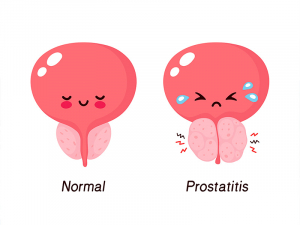Chronic bacterial prostatitis, also known as category II prostatitis, is an inflammation of the prostate gland usually caused by a persistent local infection. Compared to the acute form, chronic bacterial prostatitis has a milder course but lasts significantly longer (at least 3 months).
What are the causes of chronic bacterial prostatitis?
The disease can be a consequence of inadequately treated acute bacterial prostatitis; a result of recurrent urinary tract infections (urethritis, cystitis, etc.); a complication of a testicular infection (epididymitis). It should be noted that acute prostatitis caused by a sexually transmitted infection rarely leads to chronic inflammation. Prostatitis caused by a urinary tract infection more often becomes chronic.
Risk factors for chronic bacterial prostatitis include: use of a urinary bladder catheter; urethral stricture; prostatic hyperplasia; insufficient hydration; neglect of treatment for acute bacterial prostatitis; trauma to the urinary tract or perineal area.
How common is chronic bacterial prostatitis? According to statistical studies, chronic prostatitis develops in 20 out of 100 men at least once in their lifetime. However, only 10% of these men suffer from the bacterial form. Therefore, compared to other forms of chronic prostatitis, bacterial prostatitis is less common.
What are the symptoms of chronic bacterial prostatitis?
The signs of chronic bacterial prostatitis resemble the typical manifestations of acute bacterial prostatitis. Unlike the latter, they appear gradually, are usually less severe (for example, not accompanied by a very high fever), and ultimately come and go.
In particular, the typical symptomatology of chronic bacterial prostatitis includes: pain at the base of the penis, in the pelvic area, around the anus, in the scrotum, in the lower back and/or in the groin. Problems with urination are observed, such as: strong urges to urinate; nocturia; dysuria; hematuria; intermittent or slowed, painful urination. Furthermore, there is painful ejaculation; pain during defecation and discomfort caused by defecation; blood in the semen; low-grade fever.
What are the complications and how is it treated?
Without treatment, chronic bacterial prostatitis can cause a number of complications: prostate abscess; bacteremia or, in particularly severe cases, sepsis. There is no clear scientific evidence that chronic bacterial prostatitis contributes to the development of prostate cancer.
As with the treatment of the acute form, the treatment of chronic bacterial prostatitis is also based on targeted antibiotic therapy. Treatment is challenging due to the reduced ability of currently available antibiotics to penetrate the prostate capsule.
To minimize the risk of recurrence, it is necessary to strictly follow medical recommendations regarding the duration of antibacterial therapy and the method of administration. The most effective antibiotics include: fluoroquinolones and macrolides. The urologist at the "Boholiuby" Medical Center selects the antibiotic depending on the causative agent of chronic prostatitis.
The duration of antibacterial therapy for chronic bacterial prostatitis varies from patient to patient. In some cases, 6-8 weeks of therapy is sufficient; in other cases, 12 weeks of treatment is required; and sometimes 6 months or more.
To alleviate the typical symptoms of chronic bacterial prostatitis, particularly pain and problems with urination, it is recommended to take warm baths; drink plenty of water (2 liters per day); avoid alcohol consumption; reduce or, even better, completely exclude coffee; avoid orange juice and citrus fruits in general; and avoid hot, especially spicy, food.
Number of views: 725

















